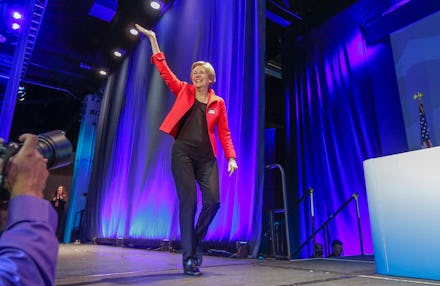Elizabeth Warren Just Scored Another Victory Over the Obama Administration

President Barack Obama's choice to fill one of the most powerful financial regulatory roles on Capitol Hill has been blocked by liberal groups led by Sen. Elizabeth Warren (D-Mass.), marking the latest in a string of mostly quiet victories for a movement aiming to draw a gleaming line between Wall Street and Washington, D.C.
According to Politico, the administration planned to nominate Keir Gumbs, a corporate lawyer, to one of five seats on the Securities and Exchange Commission, before a mass intervention led by allies of the Massachusetts senator. Gumbs worked at the SEC for six years before joining the law firm Covington & Burling as a partner.
During his time at the firm, Gumbs has made headlines advising corporate leaders as they tangle with so-called activist shareholders, investors who make demands of large, publicly traded companies. In May, a group of these shareholders nearly swayed a vote that would have denied JP Morgan Chase CEO Jamie Dimon a $7.4 million cash bonus for 2014. As first reported by the Intercept, Gumbs and a partner at Covington have also offered "one-hour primers" to corporate executives seeking to avoid public scrutiny of their companies' political donations.
The White House has resolved to hold off on making the appointment, Politico reports, tabling the question until later this summer. Outgoing commissioner Luis Aguilar's term ended in June, but he is expected to stay on until a successor is confirmed.
This is not the first time Warren has taken aim at the SEC board. On June 2, Warren's office wrote a scathing 13-page letter criticizing SEC Chairwoman Mary Jo White, an Obama appointee, for a laundry list of failures, including assorted conflicts of interest and shallow enforcement of the Dodd-Frank regulatory law.
"I am disappointed that you have not been the strong leader that many hoped for — and that you promised to be," Warren wrote.
Warren vs. Obama: Earlier this year, Warren successfully derailed another would-be Obama appointee, Antonio Weiss, by threatening to block his confirmation to the third-ranked position at the Treasury Department. Like Gumbs, Weiss was trying to move from the private sector into a regulatory role likely to put him in the middle of complex financial negotiations with the many of the same people he did business with on Wall Street. Weiss, an investment banker, withdrew from consideration as his nomination was set to expire.
While Warren's campaign to more closely monitor the revolving door between Wall Street and federal regulators has been mostly successful, the White House has managed to push through parts of its economic agenda with the support of moderate Democrats and Republicans. Despite the vocal opposition of Warren and Sens. Bernie Sanders (I-Vt.) and Sherrod Brown (D-Ohio), a bipartisan congressional majority granted Obama "fast track" authority in his negotiations to seal a 12-nation free trade pact called the Trans-Pacific Partnership.
Still, Warren's influence inside the Democratic Party will be something to watch over the coming 16 months, as Hillary Clinton attempts to corral liberal activists while maintaining a grip on the moderates her campaign is counting on for big fundraising support. With Sanders now nipping at her heels in two early primary states, Clinton's job — no thanks to Warren — is looking trickier every day.